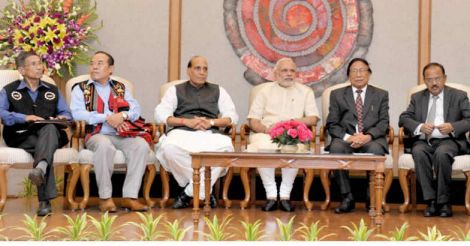People from the Konkan Coast have played a key role in the efforts to bring the Nagas of North East to the negotiating table. Before R.N. Ravi, the chief interlocutor of the central government, who recently signed an agreement for a new deal for Nagas with T. Muviah, the National Socialist Council of Nagalim (Isak-Muivah), there were four others - two from Kerala and two from Mangalore - who played a crucial role.
Two were governors in the region and the other two were central ministers who had enormous interest in integrating North East to India's political map.
It was the socialist leader and scholar M.M. Thomas, the then-governor of Nagaland, who first took up the task of engaging the underground Naga leadership in the early 1990s. He was strongly supported by George Fernandes, who was a minister in the United Front governments, which had appointed Thomas. The duo, along with Congress leader Rajesh Pilot, who served an an air force pilot in the North East before joining politics, strove hard to bring the reluctant Nagas to the negotiating table.
Later, M.M. Jacob, who was Minister of State for Home Affairs in the P.V. Narasimha Rao-led Government for the first two years, took an active interest in the North Eastern affairs and pushed forward the agreement. Being the governor of almost all the north eastern states under four different Prime Ministers, he made sure that he kept the Naga leadership engaged.
Another Congress leader who wore the hat of a political negotiator in the North East affairs was Oscar Fernandes, who was both a congress general secretary and union minister during the two UPA governments. All of them had enormous patience to hear the problems of different ethnic groups and understand their insistence on self identity.
Nevertheless, all three of them - Fernandes, Thomas and Jacob - persuaded the Naga groups to give up their insistence on breaking away from the Indian subcontinent, instead seek political and cultural autonomy within the Indian Constitution.
The details of the Naga peace accord have given rise to a lot of speculations. Both the Prime Minister and the NSCN agreed that the details would be released at the right time. Congress President Sonia Gandhi has made it a political issue that her party chief ministers in Assam, Arunachal Pradesh and Manipur have not been consulted, even though the prime demand of the NSCN is for control of Naga areas in these states and also in Myanamar as Greater Naga nation. But hints emanating from the Prime Minister's Office have indicated that the NSCN has not insisted on taking away land from the three states but only wants greater cultural autonomy for the Nagas living there.
The other heartburn is in the ministries of Defence and Home, which have been handling the insurgency in the North East. Though Home Minister Rajnath Singh and Defence Minister Manohar Parrikar were taken into confidence by Narendra Modi, and Amit Singh was present at the signing ceremony, their ministries have been kept in the dark. The talks were directly monitored by Modi and his national security adviser Ajit Doval.
It is not for the first time that such deals have been concluded in great secrecy. Even when Narasimha Rao and Atal Behari Vajpayee concluded deals with NSCN, the Home Ministry was not kept in the loop. Neither S.B. Chavan, who was Rao's Home Minister nor L.K Advani who was Vajpayee's Home Minister were directly involved, as the mediators directly reported to the Prime Minister.
The direct involvement of the Prime Ministers also happened because both Swu and Muivah insisted that they were the President and the Prime Minister of the Naga Nation and they would only deal with the Prime Minister of India in the earlier years of talks. They also initially had only wanted to hold the talks outside India.
Thus Rao, Deve Gowda, Gujral and Vajpayee had met these two leaders secretly in diverse locations such as Thailand, France and Switzerland. They later agreed to meet Vajpayee and Manmohan Singh at the Prime Minister's Office after the ceasefire was implemented in 1999 and the demand for an independent Naga Nation lost much popular appeal.
As the Prime Minister said the signing of the accord is only the beginning of a journey, especially as there are five other factions of NSCN, which have not accepted the accord and one of them led by S.S. Khaplang has been attacking the Indian Army from its bases in Myanmar. The army had retaliated last month by striking inside Myanmar territory.
Tailpiece: General V.K. Singh was in charge of North Eastern affairs in the initial months of the Modi Government. But as the rebel groups did not want a former general to deal with them, the portfolio was given to Jitendra Singh, who was a minister of state in the Prime Minister's Office last winter.











































































































































































































































 The talks surrounding the Naga accord were directly monitored by Modi and his national security adviser Ajit Doval.
The talks surrounding the Naga accord were directly monitored by Modi and his national security adviser Ajit Doval.
Disclaimer
The comments posted here/below/in the given space are not on behalf of Manorama. The person posting the comment will be in sole ownership of its responsibility. According to the central government's IT rules, obscene or offensive statement made against a person, religion, community or nation is a punishable offense, and legal action would be taken against people who indulge in such activities.